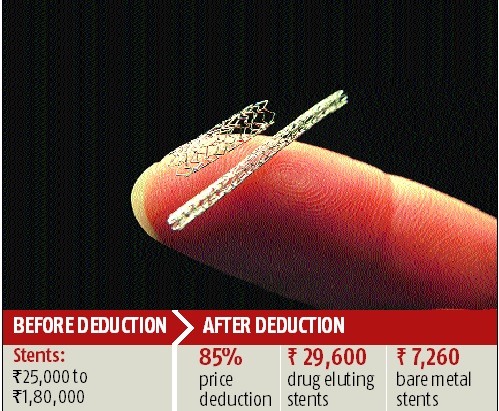Even as marquee American stent makers plan to withdraw their most advanced coronary stents from the market following the National Pharmaceutical Pricing Authority's move to cap their price, cheaper Chinese and Malaysian rivals are pushing their products aggressively. This may lead to a grey market for some of the most sought after stents that would not be officially available in the market now, fear some.
Bejon Misra, founder, Consumer Online Foundation, says, "Price capping only leads to a grey market. Doctors will smuggle stents into the market and then tell the patient that they have a USFDA-approved stent and quote a higher price for it. Instead of billing it as a stent, they will put the additional charge as part of other expenses," he says.
The NPPA on February 13 capped the prices of bare metal stents at Rs 7,260 and those of drug-eluting ones, used in about 90 per cent of angioplasty procedures, at Rs 29,600. The more advanced biodegradable stents introduced in India during the past two years were also capped at Rs 29,600. These include Abbott's fully dissolvable stent, which does not leave any residue in the heart. This stent was at a little under Rs 2 lakh before imposition of the price ceiling and its import price is Rs 42,125.
The US Consulate had earlier criticized the Indian government's decision to bring stents under price cap. "The addition of stents to India's National List of Essential Medicines (NLEM) is contrary to international regulatory norms", George Sibley, acting deputy chief of mission at the US Embassy in New Delhi said last month as he questioned India's efforts in making it a destination suitable for doing business.
Now, the US-based Abbott has submitted to the NPPA that it would like to withdraw not only its most advanced Absorb -- the company's fully dissolvable stent (one that does not leave behind any residue once the block has healed) -- but would also withdraw its other drug-eluting stent Xience Alpine. Fellow US manufacturer Boston Scientific is also reportedly considering withdrawing some of its drug-eluting stents. Joining them, in their application is Irish firm Medtronic, which plans to withdraw its Resolute Onyx. These companies are withdrawing their high-end stents stating that they are not commercially viable post the price cap.
"In a recent meeting of National Interventional Council (NIC), a number of Asian stent makers from Malaysia and China marketed their products to cardiologists", said an interventional cardiologist present at the meeting.
India has already seen the entry of Chinese stent maker MicroPort with its Target Eluting stent. MircoPort was first used at a hospital in Mumbai on February 15, within a few days of NPPA's capping. The firm has a free sale certificate in Germany and the Netherlands, and the Central Drug Standards Control Organisation (CDSCO) has approved it for sale in India. Sale of medical equipment in India is permissible if it has prior approval from drug regulators in the US, Australia, Japan or select European countries.
With this, MicroPort is eyeing a much bigger market because its stent releases drugs only to specific areas for faster healing. Studies undertaken on target eluting stents suggest the healing time is four months, while other drug-eluting stents take about a year to heal a blockage.
Dr Shirish Hiremath, President of the Cardiologist Society of India says, "Chinese stents have their own unique points. Given that the Drug Controller General's office has approved it means it can implanted." This is quite in contrast to what doctors felt at the time the NPPA capped the prices of stents. Doctors across the board felt that the price cap would lead to 'sub-standard' Chinese stents entering the market. While Chinese stent makers have made their entry into India, doctors are willingly using their stents.
"Chinese stents available in the Indian market are third generation stents (latest generation stent) and are not inferior to Abbott's stents", says Dr Purushottam Lal, Chairman, Metro Hospital, Noida.
